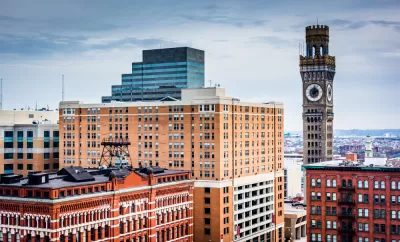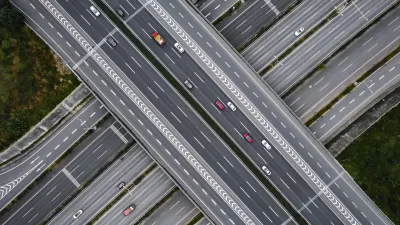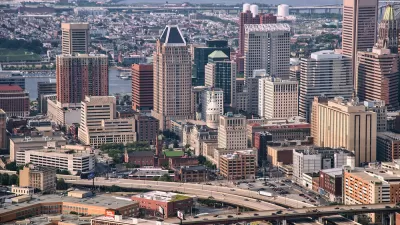The Reconnecting Communities Act would provide funding for retrofitting highway infrastructure and reconnecting neighborhoods cut off by road projects.

West Baltimore's notorious "Highway to Nowhere," a project "once intended to connect I-70 to downtown and link it to I-95 and I-83" but stopped due to community opposition, could be revitalized as part of a new federal grant program proposed by U.S. Senators Chris Van Hollen and Ben Cardin. As reported by Ron Cassie in Baltimore Magazine, the Reconnecting Communities Act "would establish a U.S. Department of Transportation grant program as part of President Joe Biden’s $2.25 trillion American Jobs Plan and assist communities in removing or retrofitting highway infrastructure that became an obstacle to mobility and economic opportunity."
The highway segment, while never completed, still had the effect of "dividing Black neighborhoods and serving as a stark example of the long history of inequity in infrastructure," according to Senator Van Hollen. The project displaced "more than 970 homes, 60 businesses, and 1,500 local residents." Since the halt of the project, a variety of redevelopment schemes have failed to come to fruition. The Red Line, a proposal to build a light rail line on the highway's median, was nixed by Governor Larry Hogan in 2015.
In 2018, "the Urban Land Institute—on behalf of the Baltimore Development Corporation—put together a report that suggested increased pedestrian infrastructure, more accessible green spaces and parks, and a retail hub and grocery store for the area could bridge the neighborhoods on each side of the highway. That study also suggested maintaining a 20-foot corridor in case the Red Line, or another mass transit project, is revived."
Mayor Brandon Scott praised the bill as a step toward "building a better Baltimore that eliminates concrete barriers to economic mobility and opportunity."
FULL STORY: Federal Lawmakers, City Officials Want Funding to End ‘Highway to Nowhere’

Alabama: Trump Terminates Settlements for Black Communities Harmed By Raw Sewage
Trump deemed the landmark civil rights agreement “illegal DEI and environmental justice policy.”

Planetizen Federal Action Tracker
A weekly monitor of how Trump’s orders and actions are impacting planners and planning in America.

The 120 Year Old Tiny Home Villages That Sheltered San Francisco’s Earthquake Refugees
More than a century ago, San Francisco mobilized to house thousands of residents displaced by the 1906 earthquake. Could their strategy offer a model for the present?

BLM To Rescind Public Lands Rule
The change will downgrade conservation, once again putting federal land at risk for mining and other extractive uses.

Indy Neighborhood Group Builds Temporary Multi-Use Path
Community members, aided in part by funding from the city, repurposed a vehicle lane to create a protected bike and pedestrian path for the summer season.

Congestion Pricing Drops Holland Tunnel Delays by 65 Percent
New York City’s contentious tolling program has yielded improved traffic and roughly $100 million in revenue for the MTA.
Urban Design for Planners 1: Software Tools
This six-course series explores essential urban design concepts using open source software and equips planners with the tools they need to participate fully in the urban design process.
Planning for Universal Design
Learn the tools for implementing Universal Design in planning regulations.
Clanton & Associates, Inc.
Jessamine County Fiscal Court
Institute for Housing and Urban Development Studies (IHS)
City of Grandview
Harvard GSD Executive Education
Toledo-Lucas County Plan Commissions
Salt Lake City
NYU Wagner Graduate School of Public Service





























